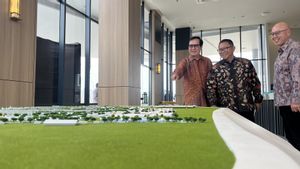JAKARTA - In today's digital era, people's lifestyle continues to change, adapting to increasingly sophisticated technological developments. Not only in the workspace or industrial sector, digital innovation is now expanding to many aspects of life.
The concept of smart living or smart housing is now a modern lifestyle trend that combines comfort, efficiency, and connectivity in one digital ecosystem.
From room temperature settings through the application, house security with smart cameras, to the use of virtual assistants for daily routines, everything can now be controlled with just a touch of fingers.
However, behind this convenience, there is one important foundation that often escapes attention, such as strong and reliable data center infrastructure.
This is the background for the presence of the latest facilities from DCI Indonesia in Cibitung, West Java. The facility, which is named JK6, is not only about the expansion of the digital business, but an important part in supporting the increasingly connected lifestyle of urban communities.
"As humans need oxygen, a smart lifestyle cannot run without a strong data foundation," said Agus Harimurti Yudhoyono, Coordinating Minister for Infrastructure and Regional Development.
With a capacity of 36 megawatts and the latest liquid cooling technology, JK6 supports a huge need for artificial intelligence, cloud storage, and an increasingly widespread household IoT system. This is proof that the data center is not only for large companies, but also has a direct impact on households that implement smart living.
SEE ALSO:
Home officials such as smart TV, automatic lights, smart speakers, and digital security systems, all depend on the smooth running of the data flow. Without infrastructure like JK6, the dream of smart housing will be difficult to realize optimally.
Interestingly, the entire construction of JK6 involves more than 8,000 local workers, asserting that digital transformation can also create an inclusive economic impact. "We prove that the nation's children are able to lead this strategic industry," said Toto Sugiri, CEO of PT DCI Indonesia Tbk.
The Minister of Communication and Digital Affairs, Meutya Hafid, also highlighted the role of the data center in supporting digital residential trends. According to him, digitalization is no longer just a matter of the corporate sector, but has touched people's daily lives.
With the estimated surge in demand from global data centers which can reach 180 gigawatts by 2030, Indonesia's position as a strategic player in the world's digital industry is getting stronger. And as digital development continues to move forward, smart lifestyles aka smart living and smart housing will become a new standard for urban communities.
Infrastructure such as JK6 not only answers technological challenges, but also creates integrated smart lifestyles, such as safer, efficient, energy efficient, and environmentally friendly housing.
The English, Chinese, Japanese, Arabic, and French versions are automatically generated by the AI. So there may still be inaccuracies in translating, please always see Indonesian as our main language. (system supported by DigitalSiber.id)

















